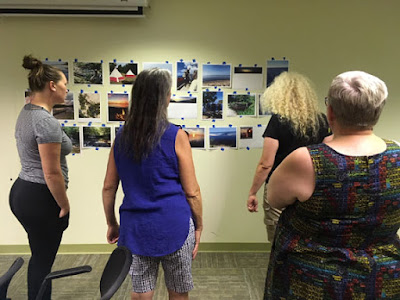From: Mining Action Group and Front 40 Environmental Fight
Posted Feb. 12, 2019*
MARQUETTE -- A new technical report from the Center for Science in Public Participation (CSP2) identifies serious faults with Aquila Resources’ Back Forty Mine Permit Amendment application, now under review by the Michigan Department of Environmental Quality.
The technical review of the Back Forty permit was conducted by Dr. Kendra Zamzow, an environmental geochemist, and Dr. David Chambers, an internationally-known expert on tailings dam safety. CSP2 analyzes mining applications in order to "provide objective research and technical advice to people impacted by mining."
The Back Forty project proposes to excavate an 800 foot deep open-pit sulfide mine on the banks of the Menominee River, 100 feet from the water. Milling will also take place on-site, using cyanide leaching, mercury recovery, and flotation. Aquila claims to be "minimizing impacts" but the footprint of the facility has ballooned to 440 hectares (1087 acres), largely due to a larger tailings management facility. Most of the mine site would be covered by waste rock, ore storage, milling facilities and tailings storage. Environmental groups claim that the Back Forty’s environmental impacts could be significantly reduced by using feasible, common-sense alternatives -- but Aquila has rejected these options.
This map from the Back 40 Mine Permit Amendment application shows a plan for the mine site, including the proposed Tailings Management Facility (large rectangular structure) and the open mining pit to the left of it and very near the Menominee River. Click on map to see full image.(Screenshot from the Back Forty Mining Permit Amendment provided by Mining Action Group.)**
Nearly all of the Back Forty rock is reactive -- capable of producing Acid Mine Drainage (AMD) when exposed to air and water. AMD pollution devastates watersheds and lasts hundreds of years. Tailings and waste rock will be stored on-site during mining, and the tailings will remain on the surface forever. Aquila has told their investors they will pursue underground mining as a "second phase" of operations, but this is not acknowledged in any permit. Underground mining could extend the mine’s life from 7 years to 16 years, greatly magnifying the risks. During closure, the open pit will be backfilled with waste and tailings. Once this takes place, groundwater contaminated with AMD is predicted to seep into the river.
This map, including the "former mine pit" and "closed Tailings Management Facility," shows some of Aquila's plans for reclamation after mining. Click on map to see full image. (Keweenaw Now's screenshot from Back 40 Mining Permit Amendment)**
CSP2’s technical report evaluated the Back Forty mining permit, including updated environmental impacts, feasible alternative designs, financial assurances, and Aquila’s proposed use of an "upstream" tailings design, the same risky construction method that has resulted in catastrophic tailings dam failures around the world.
"This report only underscores the fact that the original Mining Permit should not have been granted," said Ron Henriksen, spokesperson for the Front 40, an environmental group opposed to this mining project. "Aquila continues to provide inadequate applications with missing information. The DEQ should rescind this entire permit, have the applicant revise their mistakes, and refile it, properly formatted, with all material in one complete, organized application package."
Kathleen Heideman, a member of the Mining Action Group of the Upper Peninsula Environmental Coalition (UPEC), said the State of Michigan needs to hold a consolidated hearing on this Mining Permit Amendment, the Air Permit application, and the Dam Safety Permit application, since their environmental impacts are interrelated.
"We need a thoughtful, consolidated hearing to discuss these permits," said Heideman. "Nothing less than the future of the Menominee River is at stake."
Technical review of the Back Forty Mine Permit Amendment was made possible by a collaborative effort of the Mining Action Group, the Front 40 Environmental Fight, the Coalition to Save the Menominee River, a 2019 grant from Freshwater Future’s Great Lakes Network, and a 2019 emergency mini-grant from the Western Mining Action Network.
The deadline for submitting written comments on the Aquila Back Forty Mine Permit Amendment has been extended until 5 p.m. Friday, Feb. 15, 2019 (EST). Email comments to DEQ-Mining-Comments@michigan.gov with "Back Forty Mining Permit Amendment" as the subject.
*CLICK HERE to read this complete article, which includes the key findings of the CSP2 technical report and links to more information.
** We have edited these screenshots slightly to fit this column.
Editor's Note: See also Keweenaw Now's Jan. 23, 2019, article, "Environmental groups, Menominee Nation, community residents oppose Back 40 mining permit amendment, seek technical expertise."















































































































































